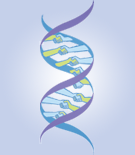User:Rachelle A. Duquette
I am a new member of OpenWetWare!
Contact Info

- Rachelle A. DuQuette
- Loyola Marymount University
- Los Angeles, CA
Education
- 2009, BS, Biology, Loyola Marymount University
BIOL 598 - Advanced Topics in Gene Expression
Annotation of Figure 3 from Gene Vaccination to Bias the Immune Response to Amyloid-β Peptide as Therapy to for Alzheimer Disease
The humoral immune response of BALB/c wild-type mice against the Amyloid-β42 monomer protein is shown by this Western blot. The first lane of each panel refers to a mouse injected with a human amyloid-β monomer protein, the second is a mouse injected with a mouse amyloid-β and the third lane is a mouse immunized with the mouse Amyloid-β42 protein plus GMSCF, granulocyte-monocyte colony-stimulating factor, which is used to further stimulate the immune system. Panel A shows the immune response of mice immunized using the short-schedule that consists of three immunizations in ten-day intervals and blood is drawn from the tail vein two weeks after the third shot. All three mice produced an immune response but the mouse injected with mouse protein alone did not produce as great a response when compared to the mouse injected with the human protein and the mouse injected with the mouse protein plus the stimulating factor. Panel B shows the immune response of mice given the long-schedule vaccination that consists of three additional shots in a one-month interval and blood is drawn two weeks after the last shot. The longer schedule of vaccinations produced a greater immune response from the mouse injected with the mouse protein compared to Panel A and the immune response is similar to the human protein injected mouse as well as the mouse plus stimulating factor injected mouse. This shows that genetic vaccination can break self-tolerance in mice, which has major implications in regards to the induced autoimmune disease. Also this data shows the strong immune response of the mice against the human Amyloid-β42 protein.
Annotation of Figure 4 from Gene Vaccination to Bias the Immune Response to Amyloid-β Peptide as Therapy to for Alzheimer Disease
The transgenic mice were further separated into an untreated group, which was used for a control, and a treated group, which was co-delivered a mixture of Amyloid-β42 and Amyloid-β16 gene constructs four times in two-week intervals. Blood was drawn two weeks after the last shot was administered. Panel A shows the results of ELISA, enzyme-linked immunosorbent assay, which was used to detect the presence of Amyloid-β peptide in transgenic mice. The control mouse showed consistent levels of an immune response while mouse one and two showed greater levels of immune response when compared to the control, especially with respect to the Amyloid-β16 peptide.
Panel B demonstrates a Western blot using the same serum from the previous experiment, resulting in similar conclusions. Mouse one and mouse two showed an immune response to the Amyloid-β peptide whereas the control mouse is negative for antibodies to the peptide. Also as shown in the ELISA graph, the immune response was highest against the Amyloid-β16 peptide.
Panel C is an ELISPOT, enzyme-linked immunospot assay, which is used to detect peripheral blood T cells releasing interferon-γ; interferon-γ’s are released by T cells in response to challenge foreign agents. Peripheral blood T cells were extracted from the mice in both groups, treated and untreated, and cultured in the presence or absence of the Amyloid-β peptide. The results demonstrate no significant cellular immune response in the vaccinated transgenic mice, meaning that gene-gun vaccination with Amyloid-β could prevent inducing autoimmune, cell-mediated meningoencephalitis.
Publications
- Qu B, Rosenberg RN, Li L, Boyer PJ, and Johnston SA. Gene vaccination to bias the immune response to amyloid-beta peptide as therapy for Alzheimer disease. Arch Neurol. 2004 Dec;61(12):1859-64. DOI:10.1001/archneur.61.12.1859 |
leave a comment about a paper here